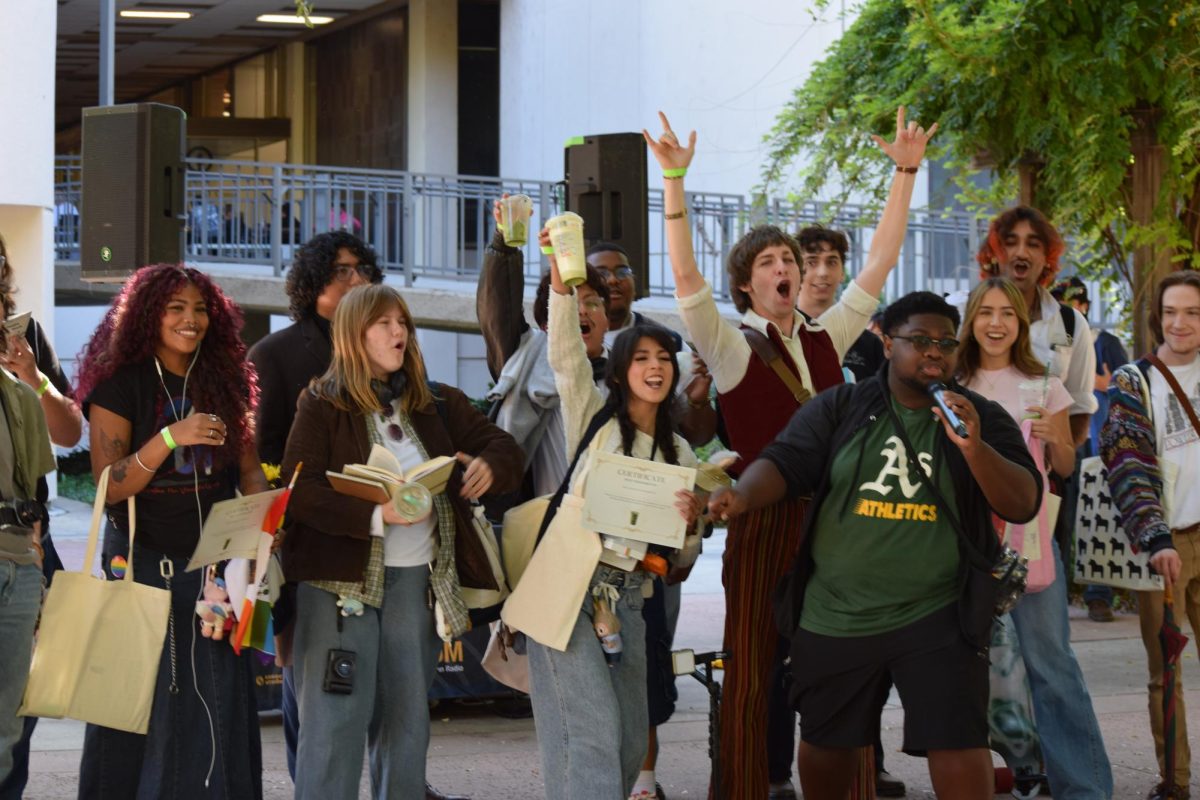Homeless: the in-need and the needy
May 13, 2014
-Kelly Abercrombie-
Residents of downtown Sacramento go about their day avoiding the invisible people of our world – the homeless.
There are varying degrees of invisibility exhibited by the homeless. Some are gracious, courteous and can interact with the people around them, but others are avoided at all cost because they are yelling profanities or demonstrating public indecency.
The Downtown Sacramento Partnership, known for putting on events in Sacramento, has a community outreach program called the navigators.
One navigator named Crystal Richardson, 42, helps the homeless population in the immediate area.
A homeless gentleman that Richardson has helped out extensively is Malcolm Fitzgerald Harvey, 30, from Chicago.
“My family is already out here in California,” said Harvey. “I moved to Marysville because there was a lot of stuff going on dealing with courts and what not. System some how took my little brother so I was thinking I was coming up there to help, but I jumped in at the wrong time. My little brother rushed me up here and didn’t have none of my stuff together and thats why I am like this today.”
Harvey utilized Sacramento Loaves and Fishes, which is a nonprofit organization that helps in the effort to support the homeless in the area.
Loaves and Fishes aids many homeless in the area, but there needs to be a better safety net to help people get through tough times.
There are social factors influencing how a person becomes homeless and Loaves and Fishes Executive Director Libby Fernandez says one is lack of support.
“The most important factor, that is a common thread, is the lack of permanent support for housing,” Fernandez said. “Rent is 30 percent of a persons income and supportive housing, [and other] compiling issues like mental health and addiction issues, is the problem.”
Andrew Bein, a Sacramento State professor in the division of social work, has been practicing social work for 30 years. He worked in an agency setting with low income communities such as Chicago and has been with Sac State for twenty years.
“There is a lack of governmental and institutional will to address the issues seriously. There is always the, ‘not in my backyard’ kind of thing, so you have to work with developers to dedicate lower income housing,” Bein said. “People believe in blaming the victim. I think there is a psychological benefit, you don’t have to feel the grief that people are suffering.”
From the surface, local residents believe the Sacramento area offers enough support to the homeless, but the real issue that needs to be focused on is the fact these are human beings who were dealt a bad hand.
“It is just awful how people treat [other] people,”Harvey said. “You just wonder why these homeless people just gave up, just skip out and do not care anymore, they are like ‘I’m just going to go crazy and just talk to myself.’ I mean its more of the community not having that much support for the homeless. This has been one time I am never ever going to forget, and once I do get back working, I am never going to wanna give up my job again.”
Every program in the downtown area had an issue with Harvey’s pit bull puppy, and he is going to be able to get him fixed so they allow him the full support of their services. Harvey has been homeless for three months and will be entering a training program.
Previously, he was a construction worker and hopes to go to the Culinary University of Sacramento, once he gets stable work.
Fernandez said if we could have rent control, people who have rent based on income could afford a place to live. This is just one possible solution to help the homeless in the area, but the real solution is compassion and understanding.
-Brittany Cracchiolo-
These days, it can be difficult to tell who is homeless and who is just panhandling. Whatever the situation may be, there are other ways of getting back on track, but it requires individual willpower to change.
Panhandling is illegal, yet there are many people standing on busy street corners and even on the middle divider, asking for money. Some even use guilt to help people part with their money.
“I saw a lady asking for money to support her kids, and then I saw her climb into a new van and start counting money,” said junior Biology major Felicia Rafalowski.
Society wants to help people having a difficult time, yet it is coming to a point where some are not willing to work and use a sign as their primary source of income.
Hard-working members of the community are rolling the dice by giving money to the people on the corners because they could be giving away their money to someone who is not really in need. These people could actually be members of society that would rather stand on the corner than hold a day job.
When people appear day after day with the same signs and a “quick money” mentality, it becomes difficult to want to help them because it does not seem like they have any interest in changing the way they live. There are services in Sacramento that offer help to people in need, but it is up to the individual to seek assistance.
“I think there is help offered, but they don’t want it,” said sophomore business management major Andrew Pryor. “Some homeless people use money to push their addiction, while some use it for the necessities that they need.”
There are good people in this world and there are services that are willing to help people in need. If these people asking for assistance are homeless, there are outlets in the local community that they can reach out to for help.
According to the Loaves and Fishes website, they welcome those in need and give them a place to feel safe and loved. Other services include Family Promise of Sacramento and Saint John’s Program for Real Change located in the Sacramento area.
By continuing to fund these street-peddlers, society is only harming the chances for change. It is much easier to take a handout day after day than it is to change their mindset and make the conscious choice to improve the quality of life.
People are creating an epidemic that spreads from corner to corner when they give money to these people standing on the meridians.
“I have never given a homeless person money. I have bought them food so that they were not hungry,” said sophomore business management major Shane Austin. “Giving them money allows them to continue their lifestyle and feed their addictions.”
If a person wants to help, giving money to a charity that provides services to the homeless is an excellent idea. When you see people asking for support on the streets, give them snacks or gift cards to fast food restaurants, but save your cash.
You never know if one day that dollar could be the difference between paying bills or feeding your own family.





























































































































